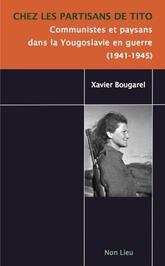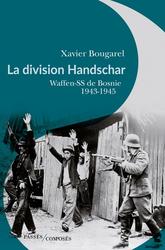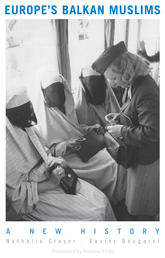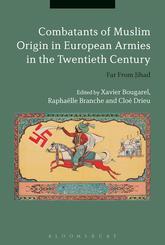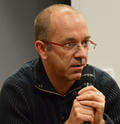
Xavier Bougarel
Chercheur.e statutaire
Directeur de rechercheInstitution de rattachement principal : Centre d’Études Turques, Ottomanes, Balkaniques et CentrasiatiquesÉquipe(s) : Balkans contemporains
Coordonnées professionnelles
Campus Condorcet / EHESS
CETOBaC (UMR8032)
Bureau 618
2, cours des Humanités
93322 Aubervilliers Cedex
France
+33 1 88 12 04 19
Présentation
Diplômé de l’Institut d’études politiques de Paris en 1990, j’ai été lecteur de français à la faculté de droit de l’université de Belgrade d’octobre 1990 à juin 1992. J’ai soutenu en janvier 1999 une thèse de doctorat à l’Institut d’études politiques de Paris sur le sujet Islam et politique en Bosnie-Herzégovine : le Parti de l’action démocratique. En 1999, j’ai été recruté au CNRS comme historien (section 33), et affecté au laboratoire Etudes turques et ottomanes (UMR 8032, devenu le CETOBAC en 2010), laboratoire auquel je suis resté rattaché jusqu’à aujourd’hui. En 2002, j’ai conduit pour la Banque mondiale une recherche intitulée Social Capital and Local Level Institutions in Bosnia-Herzegovina. De septembre 2013 à août 2016, j’ai été affecté au Centre Marc Bloch à Berlin pour mener des recherches en archives sur la 13e division SS « Handschar ». En septembre et octobre 2017, j’ai été chercheur résident à l’Ecole française d’Athènes, où j’ai travaillé sur l’historiographie grecque de la Seconde Guerre mondiale.
Academic background
After graduating from the Institut d’études politiques in Paris in 1990, I was a lecturer in French at the Faculty of Law of the University of Belgrade from October 1990 to June 1992. In January 1999, I defended my PhD dissertation at the Institut d’études politiques in Paris, on the topic Islam and Politics in Bosnia-Herzegovina: The Party of Democratic Action. In 1999, I began working as an historian at the CNRS (section 33), and was assigned to the laboratory Études turques et ottomanes (UMR 8032, which became the CETOBaC in 2010), where I have worked ever since. In 2002, I conducted a research study for the World Bank entitled Social Capital and Local Level Institutions in Bosnia-Herzegovina. From September 2013 to August 2016, I was on detachment at the Centre Marc Bloch in Berlin, where I carried out archival research about the 13th SS Division “Handschar”. In September and October 2017, I was a researcher in residence at the École française d’Athènes, where I researched the Greek historiography of the Second World War.
Intérêts scientifiques
Mes recherches portent sur trois sujets distincts :
- l’islam en Bosnie-Herzégovine et dans l’Europe du Sud-Est, avec un accent mis sur la redéfinition des liens entre identité religieuse et identité nationale, la reprise des échanges entre les musulmans balkaniques et le reste du monde musulman, le pluralisme interne des institutions religieuses islamiques et des communautés musulmanes, la diversification et l’individualisation de leurs croyances et pratiques religieuses. J’ai également effectué des recherches plus historiques sur les rapports entre islam et identité nationale en Bosnie-Herzégovine dans la période post-ottomane, et sur les débats entre réformistes et traditionnalistes dans la Bosnie-Herzégovine de l’entre-deux-guerres ;
- les guerres et les après-guerres dans l’espace yougoslave, avec un accent mis sur le cas de la Bosnie-Herzégovine. Concernant la guerre de 1992-1995 en Bosnie-Herzégovine, je me suis attaché à préciser le fonctionnement des rapports intercommunautaires dans la société bosnienne, tant sur le plan politique que dans la vie quotidienne, ainsi que les facteurs ayant conduit à leur crise. Je me suis également intéressé aux mobilisations miliciennes et à leurs crises, et aux économies mafieuses qui les sous-tendent. Concernant l’après-guerre, je me suis intéressé aux approches anthropologiques de la société bosnienne, qui permettent de dépasser les perspectives trop étroitement juridiques ou ethniques, et j’ai privilégié dans mes propres travaux l’étude des anciens combattants comme un des groupes sociaux nés de la récente guerre. J’ai également travaillé sur les suites judiciaires et politiques du massacre de Srebrenica ;
- l’histoire sociale de la Seconde Guerre mondiale en Europe du Sud-Est : de 2013 à 2016, j’ai été rattaché au Centre Marc Bloch à Berlin, où j’ai conduit une recherche en archives sur la 13e division SS « Handschar », composée d’officiers allemands et de soldats bosniaques. L’ouvrage issu de cette recherche, La division Handschar. Waffen-SS de Bosnie 1943-1945, est paru en 2021. Parallèlement, en 2017, j’ai codirigé avec Raphaëlle Branche et Cloé Drieu l’ouvrage Far from jihad. Combatants of Muslim Origin in European Armies in the 20th Century. En 2019, j’ai codirigé avec Hannes Grandits et Marija Vulesica l’ouvrage Local Dimensions of the Second World War in Southeastern Europe, insistant sur la manière dont des monographies locales permettent de renouveler nos approches et notre compréhension de la Seconde Guerre mondiale. Enfin, j’ai achevé en 2022 une monographie sur le mouvement des partisans yougoslaves dans la région de la Krajina bosnienne, mettant l’accent sur leurs pratiques politiques, économiques et judiciaires dans les territoires libérés. L’ensemble de ces ouvrages convergent vers une histoire sociale synthétique et renouvelée de la Seconde Guerre mondiale en Europe du Sud-Est (Yougoslavie, Bulgarie, Grèce, Albanie), sujet auquel je compte consacrer les années à venir.
Research topics
My research focuses on three distinct topics:
- Islam in Bosnia-Herzegovina and Southeastern Europe, with a focus on the redefinition of the links between religious and national identity, the resumption of exchanges between Balkan Muslims and the rest of the Muslim world, the internal pluralism of Islamic religious institutions and Muslim communities, the diversification and individualization of their religious beliefs and practices. I did also more historical research on the relationship between Islam and national identity in post-Ottoman Bosnia-Herzegovina, and on the debates between reformists and traditionalists in interwar Bosnia-Herzegovina.
- wars and post-war periods in the Yugoslav space, with an emphasis on the case of Bosnia-Herzegovina. Concerning the 1992-1995 war in Bosnia-Herzegovina, I focused on communal relations in Bosnian society, both at the political level and in everyday life, as well as the factors that led to their crisis. I have also researched (para-) military mobilization and its crisis, and the criminal economy that underlied them. Concerning the post-war period, I have been interested in the anthropological approaches to Bosnian post-war society, which go beyond purely institutional or ethnic perspectives, and I have privileged in my own work the study of war veterans as one of the social groups born of the recent war. I have also worked on the legal and political aftermath of the Srebrenica massacre;
- the social history of World War II in Southeastern Europe: from 2013 to 2016, I was attached to the Centre Marc Bloch in Berlin, where I conducted archival research on the 13th SS Handschar Division, made of German officers and Bosniak soldiers. The book resulting from this research, La division Handschar. Waffen-SS en 1943-1945, was published in 2021. In parallel, in 2017, I co-edited with Raphaëlle Branche and Cloé Drieu the book Far from jihad. Combatants of Muslim Origin in European Armies in the 20th Century. In 2019, I co-edited with Hannes Grandits and Marija Vulesica the book Local Dimensions of the Second World War in Southeastern Europe, emphasizing how local monographs allow us to renew our approach and understanding of the Second World War. Finally, in 2022, I completed a book on the Yugoslav partisan movement in the Bosnian Krajina region, focusing on their political, economic and judicial practices in the liberated territories. All these works converge towards a renewed social history of the Second World War in Southeastern Europe (Yugoslavia, Bulgaria, Greece, Albania), a subject to which I intend to devote myself in the coming years.
Champs
Balkans contemporains
Islam : histoire et anthropologie
Terrain(s) / Aire géographique
Bosnie-Herzégovine, Serbie, Croatie
Europe du Sud-Est
Enseignements
Je n’assurerai pas d’enseignement au cours de l’année universitaire 2022-2023.
Publications principales
Ouvrage
La division Handschar. Waffen-SS de Bosnie 1943-1945, Humensis, Paris, 2021, 437 p. (traduit en bosnien)
Survivre aux empires. Islam, identité nationale et allégeances politiques en Bosnie-Herzégovine, Karthala, Paris, 2015, 383 p. (traduit en anglais et en bosnien)
(rédigé avec Nathalie Clayer), Les musulmans de l’Europe du sud-est. Des Empires aux Etats balkaniques, Karthala, Paris, 2013, 349 p. (traduit en anglais, en serbe et en grec)
Bosnie: anatomie d’un conflit, La Découverte, Paris, 1996, 174 p. (traduit en serbe et en bosnien)
Directions d’ouvrage
(dirigé avec Hannes Grandits et Marija Vulesica) Local Dimensions of the Second World War in Southeastern Europe, Routledge, London, 2019, 281 p.
(dirigé avec Raphaëlle Branche et Cloé Drieu) Far from Jihad. Combatants of Muslim Origin in the European Armies in the 20th Century, Bloomsbury, London, 2017, 238 p.
(dirigé avec Isabelle Delpla et Jean-Louis Fournel) Investigating Srebrenica. Institutions, Facts, Responsibilities, Berghahn, New York, 2012, 200 p.
(dirigé avec Elissa Helms et Ger Duijzings) The New Bosnian Mosaic. Identities, Memories and Moral Claims in a Post-War Society, Ashgate, Aldershot, 2007, 332 p.
(dirigé avec Nathalie Clayer) Le nouvel islam balkanique. Les musulmans, acteurs du post-communisme (1990-2000), Maisonneuve & Larose, Paris, 2001, 508 p.
